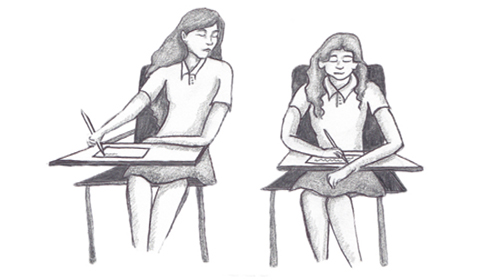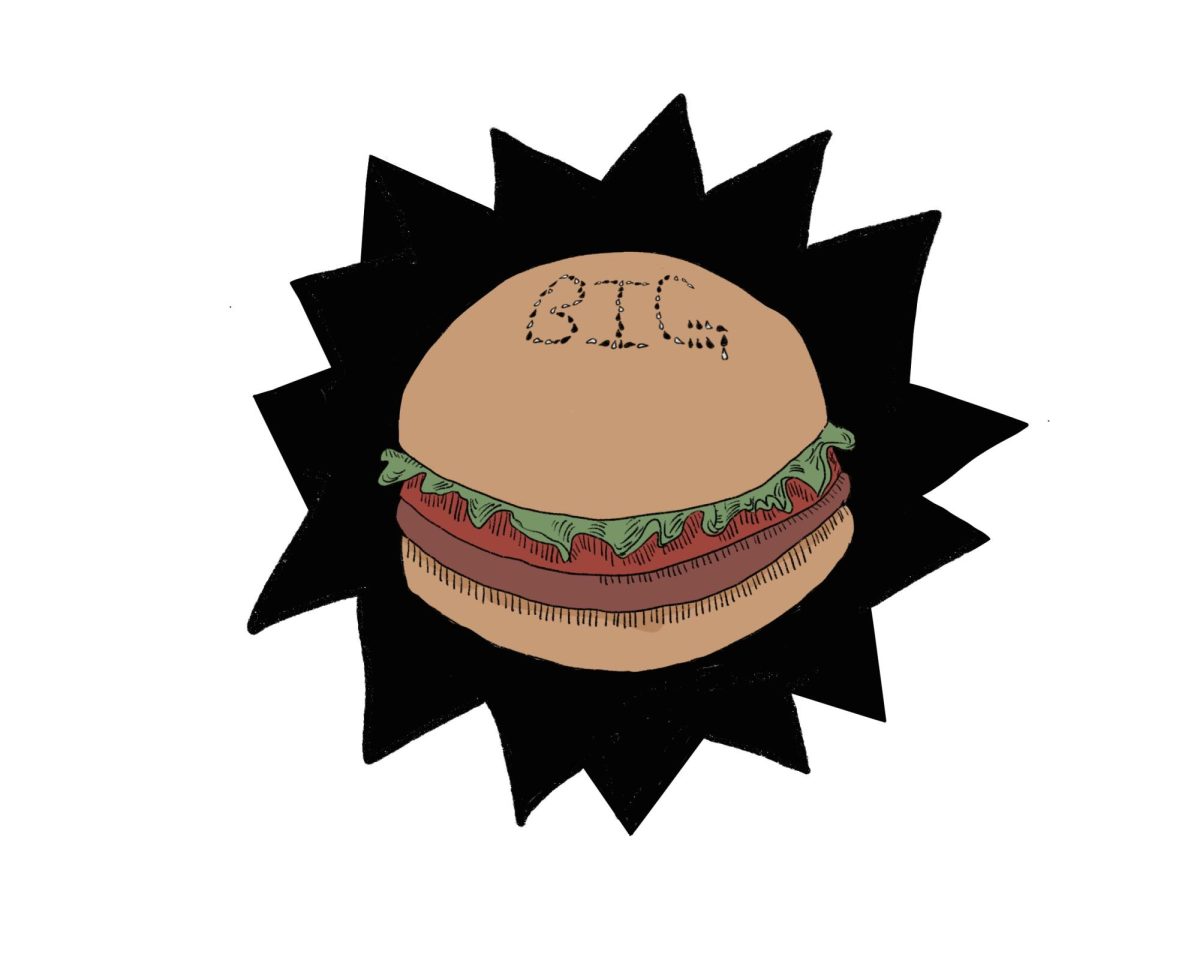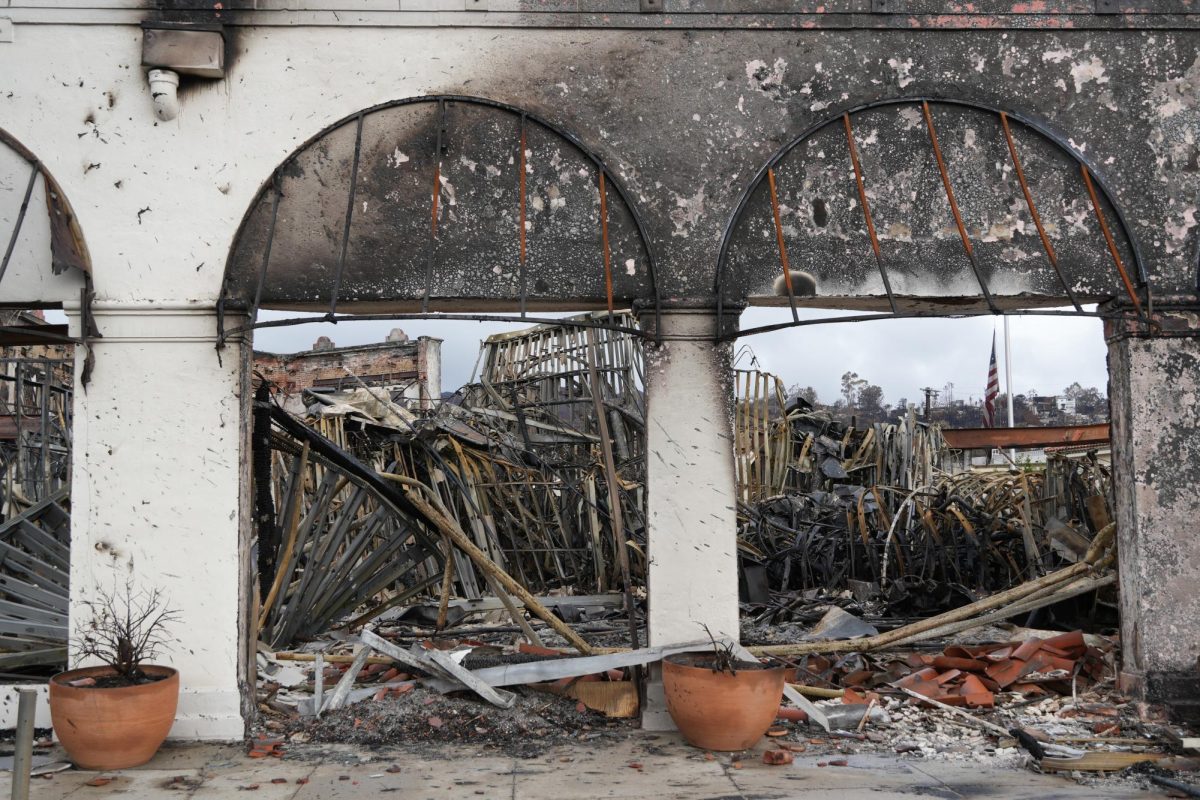
By Lilia ’15, Cameron ’15 and Christina ’14
Nancy* was sitting at her desk after finishing a test early. As she looked around the room, she noticed a classmate using notes hidden in her backpack to help her write the assigned essay.
Nancy was shocked: this was the first time she had seen a student violate the Honor Code so blatantly, and she immediately found herself wondering how she should respond. She decided to inform her Grade Level Dean, although she felt uncomfortable “telling” on a peer. But Nancy never found out what happened to the girl, which frustrated her. The girl is still a student here, so did she face no consequences for cheating?
The Understanding, a section in the Student Handbook of Expectations that discusses individual responsibility, honor and self-discipline, states that a second Honor Code violation will lead to dismissal from the School.
Marlborough stresses the importance of the academic side of the Honor Code, which lays out the expectations the School has for the integrity of its students. Girls are asked to write out and sign a pledge on each assessment: “On my honor, this is my own work.” Most teachers and students interviewed said they believe that girls respect the Honor Code. Despite annual discussions at All-School Meetings and in Middle School Advisories, several of those interviewed wonder how seriously the administration takes academic breaches of the Code.
Assistant Head of School and Director of Upper School Laura Hotchkiss initially stated that she could not recall a student who had been expelled for a violation of the Honor Code in the past ten years. However, she later clarified over e-mail that she could not be sure because the administration “does not keep a record as violations do not become part of a student’s file… All record is just memory.” Hotchkiss also said that she did not remember the number of expulsions in the past 20 years. However, some teachers have said that expulsions used to happen about every other year but tapered off about a decade ago. The recent decrease in expulsions implies that no one has committed a second violation.
Should students be allowed to know what happens to a girl when she violates the Honor Code? Does the lack of transparency prevent the administration from being held accountable for its decisions? Have students really become more honorable in the past decade, or has Marlborough made it more difficult to be expelled?
WHAT IS THE PROCESS?
When a student at Marlborough is caught cheating, the School initiates a lengthy process to determine her punishment, a process that few students seem to understand, contributing to the perception that consequences for academic dishonesty might be inconsistent.
In the case of a second violation, the School calls together the Honor Forum, an advisory committee of seven anonymous students and two faculty members, who suggest a punishment to Head of School Barbara Wagner; however, Wagner makes the final decision.
Head of the English Department Reid Cottingham, who served as a faculty representative on the Honor Forum for seven years, said she supports giving students a second chance. Many teachers and students agreed, saying they feel this practice is necessary for a School that places so much stress on its students.
“I don’t think that people break the Honor Code to be distrustful. I think they’re just in survival mode,” math instructor Mandy Kissinger noted.
Emily ’15 agreed: “If someone effs up and they’re in 7th Grade… it’s 7th Grade. They don’t know what they’re doing,” she said.
Hotchkiss said she works particularly hard to consider the student’s intention.
“I’m going to try to determine what happened based on an accumulation of information,” she said. “Part of the investigation is… the intention of this act.”
Incidents that seem accidental do not result in punishment. If a student commits a second intentional breach, Hotchkiss said that the student is always sent to the Honor Forum.
However, some students said that they are concerned that the administration’s ultimate decision is dictated by factors other than an objective assessment of a student’s integrity.
Lucy ’13 said that she believes that the punishment “depends on the person and what ranking they have in this School,” explaining that she thinks a person’s contributions to the community, such as holding a position on Class Council, would affect the consequences of her actions.
Julie ’15 agreed, saying she worried money might play a role in the decision to punish or overlook an offense.
“I don’t like it when people don’t get accused or called out on something because their parents happen to be big donors to the School,” she said.
WHY CONFIDENTIALITY?
The administration upholds a policy of confidentiality for all Honor Code violations and accusations. Many teachers and students said they supported this policy because it protects students from public humiliation, but some girls said that they believe the lack of transparency prevents the administration from being held accountable.
Most teachers said they appreciate that violations are discussed only by the administration and the accused girl’s family, because this allows the girl to recover.
“The more people you get involved through the process, the murkier it gets, and then it is not fair to the student,” Cottingham said.
Lindsey ’16 agreed, saying, “I just think it’s good if [the School] sorts it out themselves. It puts less stress on the student.”
But Nancy said that she feels that students cannot tell if the Honor Code is being enforced if they do not learn about the consequences, especially if girls witness a violation themselves.
“I want to know what happened because I feel like people who violate the Honor Code need to be punished. Otherwise it sets the standard that students can do whatever they want without getting in trouble,” she said.
At Harvard-Westlake School, when a student disobeys their Honor Code, the Honor Board, a group of anonymous students, decides on the final penalty. If a student is caught cheating, all of his or her teachers are informed and he or she receives a zero on the assignment. Every time the Honor Board meets to discuss a violation, the administration sends an e-mail to all students with the details of the violation and punishments, using fake names.
Some students, such as Kiki ‘13, said that they feel that the reason no one has been expelled recently is that the Marlborough administration wants to protect its reputation for having trustworthy students.
“We’ve heard a lot of cases, like at Marymount [High School], where students have just been thrown out, and I don’t know one student that has been kicked out of Marlborough. I think it’s all because of the reputation. It would make Marlborough look really bad,” she said.
However, Hotchkiss asserted that confidentiality was necessary to prevent a student from being publicly humiliated and permanently scarred by the incident, perhaps never regaining confidence.
“I think that there has to be a trust in the administration that action will be taken as the policy dictates,” Hotchkiss said.
THE GREY AREA
Many students said they feel that the Honor Code contains grey areas that lead them to question whether what they have observed is really in violation of the School’s standards for academic integrity. Some students said that they have refrained from reporting or confronting people about suspected wrongdoings because of the lack of clear guidelines.
Stefanie ’16 said she has mixed feelings about what constitutes an appropriate response in these ambiguous situations.
“Sometimes I know the person knows [the topic] and they haven’t had a lot of time to do things, [so] you have sympathy for them. If it’s three sentences, it won’t give them a huge advantage,” she said.
Johnson mentioned that it is sometimes difficult to tell the difference between working collaboratively and copying work because the School does not provide definite guidelines. She recalled a packet of Honor Code scenarios provided by School Counselor Emily Vaughn for her Advisory. Some of the situations, she explained, were obviously violations, while others seemed acceptable. When the morality of a situation was less evident, her Junior or Faculty Advisors dismissed the issue.
“Sometimes they said, ‘It’s just a grey area,’ and didn’t explain anything else after that. We wondered what you would do [in such a situation]. Would you report it?” she said.
Students sometimes see copying homework as acceptable, but faculty members can be more decisive. For example, during a fire drill math instructor Alison Moser once caught a student copying her friend’s homework. Moser reported the incident to the Division Director at the time.
Moser said inconsistencies can also arise between subjects and teachers.
“Different teachers and different subjects call for different guidelines,” she said.
Private tutors help many students with their academic work, aiding them with everything from math problems to essays. This wide range of engagement has generated concern that working too closely with a tutor could violate the Honor Code. Some students, such as Julie, said that tutor assistance is only appropriate up to a certain point. However, Julie said she is concerned that other students do not see tutoring in the same way.
“I think girls who use tutors [for direct help on essays or labs] don’t think they think they are cheating. To me, that seems like cheating, but to them they probably think it’s studying or working on their essays,” she said.
Faculty Advisor of the Honor Forum and English instructor Deborah Banner said that she can tell when a student has had too much help from a tutor when comparing the quality of her take-home essays to her in-class essays.
“If you have everybody doing the assignment in class, they can’t cheat on it because we can supervise them, and we know, whereas if someone is at home and working with a tutor who is really aggressive about directing her how to write a sentence, we can’t keep track of that,” she said. Banner added that she would consider this issue in the “grey area,” meaning the situation may or may not be an Honor Code violation.
Students said these grey areas make it difficult to know what potential violations they should or should not report, putting them at risk of getting in trouble for something that they did not know was a breach of the Honor Code.
“The problem isn’t the grey area,” Mary ’14 said. “The problem is no one’s ever punished for higher level violations. It allows the grey area to exist, because the Honor Code as a whole isn’t taken as seriously as it could be.”
*Names have been changed for all sources without last names.












